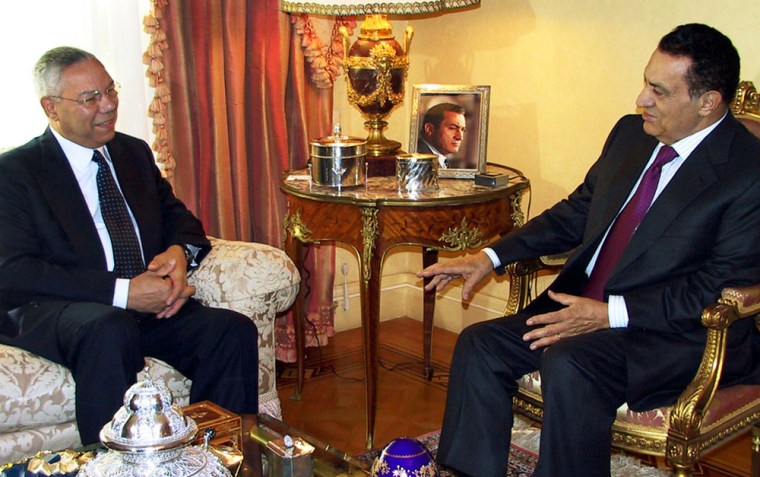U.S. Secretary of State Colin Powell, in Cairo on Wednesday, before continuing on to Saudi Arabia for talks, commented on a number of critical topics in the region — from violence in Iraq, to the Mideast peace process and the need for action from the world community on the crisis in Sudan.
In what has become a familiar refrain, Powell condemned Wednesday’s latest suicide bombing in Iraq and said he believes Iraqi elections could still take place in January, as planned.
“Once again it's an attempt by murderers to deny the Iraqi people their dream — a peaceful country that rests on a solid foundation of freedom,” said Powell. “They're killing Iraqis for the purpose of denying Iraqis the basic freedoms the rest of the world increasingly is enjoying. We have to condemn it, we have to fight it, we must not let the kind of tragic incidents deter us from our goals."
Powell also talked about the need to protect United Nations election workers preparing for Iraqi elections, which he said can happen on schedule in January. This weekend a 1,000-delegate national conference is scheduled to meet in Iraq to choose a national council in order to advise the interim Iraqi government, now in power.
In an interview with Egyptian television, Powell said the United States would like to put together a meeting of Iraq and its neighbors — similar to what Egypt just hosted in Cairo — "but to expand that meeting, so other nations that have an interest in Iraq, the G-8 perhaps … might participate" to help the Iraqi government.
A senior U.S. State Department official told reporters that Egypt renewed its offer to train Iraqi security services, an offer already made to Iraqi Prime Minister Iyad Allawi. The official said the countries must work out the details.
While in Egypt, Powell met with Egyptian President Hosni Mubarak and a senior State Department official said Powell found him to be looking good and doing well. A senior official said that Mubarak briefed Powell on his discussion with Arafat on Tuesday.
Powell comments on Palestinian compromise
On Tuesday, Powell criticized lack of action to date by the Palestinian Authority, branding Palestinian National Authority President Yasser Arafat the "master of the ambiguous statement," on a "yo-yo string" that keeps getting pulled back.
But, by Wednesday, in Cairo, Powell struck a more diplomatic note, telling reporters he hoped that Tuesday's statements giving additional authority to Palestinian Prime Minister Abu Ala are born out, that he "will be able to provide political control and security control over Gaza" with Egyptian help.
Powell went a bit further in an interview with Al Akhbar newspaper, saying, “We will be working with the Palestinian side if in fact they have now empowered Palestinian Prime Minister Ahmed Qureia to be in charge of the security services and to bring political order and security order to Gaza as the Israelis are withdrawing."
Sanctions against Sudanese government may be needed
In both a news conference in Cairo and in local interviews, Powell said sanctions may be needed against the Sudanese government in order to disarm Arab militias blamed for killing thousands in the western region of Darfur. But Egyptian Foreign Minister Gheit, in a joint news conference, said Sudan needs more time.
A senior State Department official, speaking on background, said the Egyptians told the United States they will be getting in touch with Sudanese President Omar el Bashir, with whom the official said the Egyptians carry some weight. On sanctions, the official said the Sudanese don't want to see it reach that point.
A U.S. draft Security Council resolution — which could be voted on as soon as Thursday or Friday — calls for the consideration of sanctions after 30 days. Though in the interview with Al Akhbar newspaper, Powell questioned what Sudan could do in a month that it cannot be doing now.
Next stop — Saudi Arabia
Powell arrived in Jeddah, Saudi Arabia, Wednesday afternoon. He is meeting Wednesday night with the aging King Fahd bin Abdul Aziz Al Saud — at Fahd's request — as well as Crown Prince Abdullah and Foreign Minister Prince Bandar bin Sultan bin Abdul Aziz Al Saud.
Thursday he is scheduled to meet with Iraqi Prime Minister Allawi, who is visiting the Kingdom of Saudi Arabia, as part of an effort to energize relations with Iraq's neighbors.
While in Saudi Arabia, Powell is also scheduled to meet with reformers behind closed doors, as he did more than a year ago. Saudi officials say that reforms are under way, but must be done at a pace to gain and maintain popular support. Critics say the United States must do more to hold Saudi Arabia's feet to the fire and promote reform — a critical element in the war on terrorism, they say.
A senior State Department official said Powell will discuss terrorism, Iraq, the Middle East, and reform while in Saudi Arabia, but the main purpose of the secretary of state's visit is to show support for Saudi Arabia in the war on terrorism. The official said they will talk about the need for and how to achieve stability in the region. It's good, he said, for the region, Iraq and the future of Saudi Arabia.
